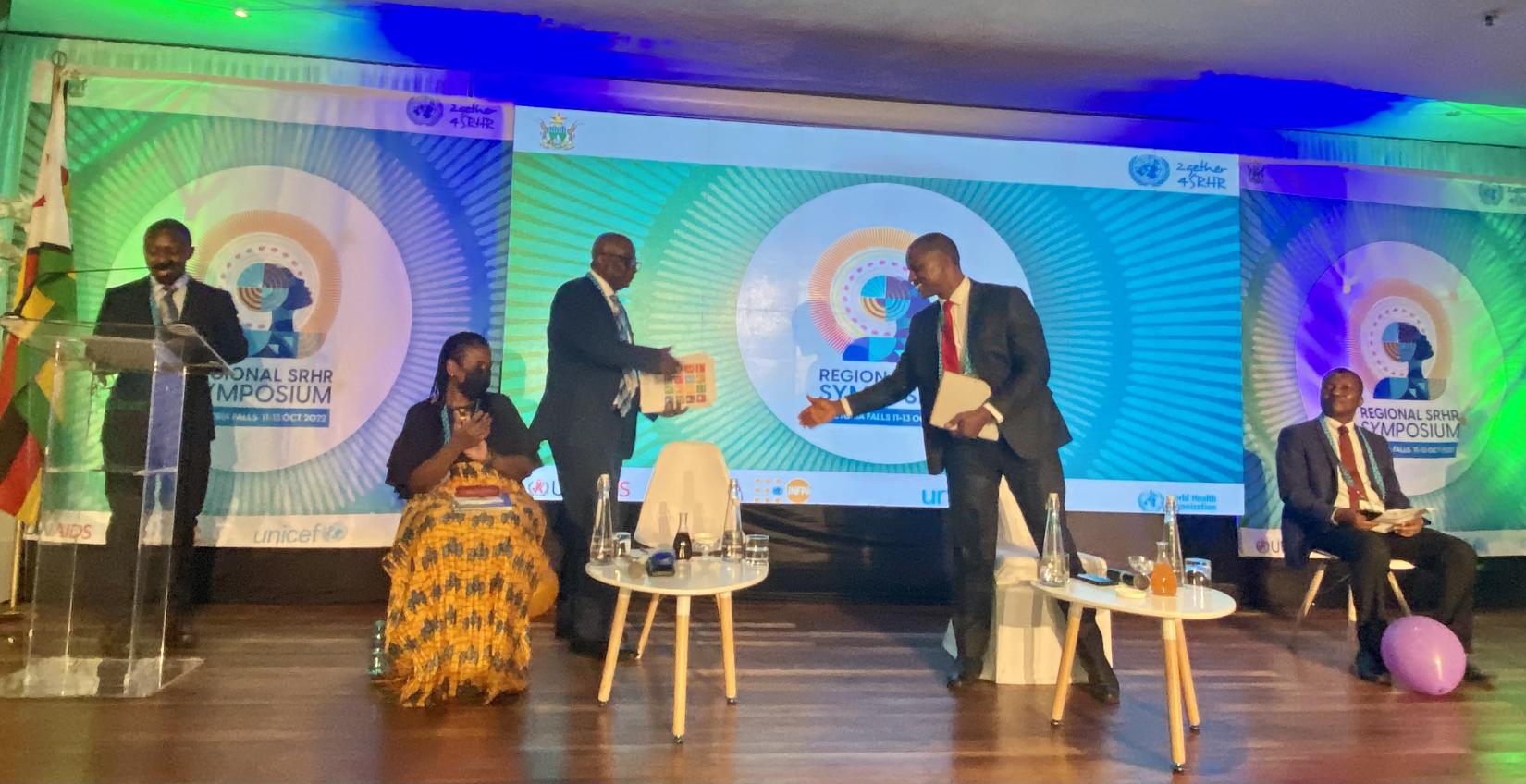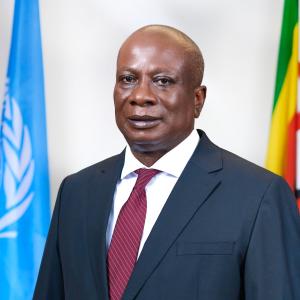Regional Knowledge Sharing Symposium: 2gether4SRHR programme
the collaborations shed a light on gender equality, masculinity, and prevention of violence against women and girls in private and public space

Honourable Vice President and Minister for Health and Child Care, Dr Constantino Chiwenga, represented here by Deputy Minister for Health and Child Care, Dr John Mangwiro;
Secretary for Health and Child Care, Air Commodore (Dr) Jasper Chimedza
UNFPA Deputy Regional Director, Ms. Ogbonna,
Ambassadors here present,
Representatives of the Government of Sweden present,
Representatives from SADC and the East Africa Community EAC,
Heads of UN Agencies and Members UN family present here
Senior Government officials represented here,
Civil Society Representatives,
Young People,
Members of the media here present
Ladies and Gentlemen
I am deeply honoured to join you today at this regional knowledge sharing symposium as we mark an equally important day – the 10th anniversary of the International Day of the Girl Child.
From the outset, I would like to congratulate and thank the Government of Zimbabwe, particularly the Ministry of Health and Child Care for the leadership in hosting this timely symposium.
Allow me to also take this opportunity to thank my colleagues from UNAIDS, UNFPA, UNICEF and WHO for the technical support they provided for this symposium.
Ladies and Gentlemen:
We have a cause to celebrate today!
The 2gether4SRHR programme has clearly demonstrated how strategic partnership and joined-up efforts of Governments, Development Partners, civil society, the UN agencies at the regional and country level can successfully work together and deliver integrated services for women and girls on Sexual Health Rights, HIV, and tackle gender-based violence.
I am reliably informed that the programme demonstrated and paved the way to support upstream interventions at all levels including:
- High-level advocacy.
- Support to data generation and accessibility.
- Setting policy frameworks and enhancing pre- and in-service training for health workers.
- Development and piloting of innovative approaches.
- And at community level, within and beyond the health delivery system.
I believe this knowledge sharing symposium provides a timely opportunity to amplify the collective lessons drawn over the past five years of implementation of the 2gether4SRHR.
This strong partnership has supported East and Southern African countries to strengthen sexual and reproductive health outcomes for all people and contributing to accelerated efforts towards achieving the SDGs.
In Zimbabwe, a strong partnership has been developed between UN Agencies, Sida, the Ministry of Health and Child Care, the Zimbabwe National Family Planning Council, the National AIDS Council, and several civil society organisations as we worked together to implement the programme.
Funding provided through the 2Gether4SRHR programme facilitated identifying and addressing bottlenecks, that were preventing the intended beneficiaries from enjoying their right to appropriate health care and wellbeing. Integration of available services was identified as a key enabler for broadening service access while at the same time improving quality and demonstrating the value for both human and financial resources.
Ladies and Gentlemen:
I would like to express my appreciation to the Government of Sweden for its willingness to let the 2Gether4SRHR programme adapt to unforeseen challenges that the country faced during this funding cycle.
For example, Cyclone Idai in March 2019 cut its victims off from essential supplies and other critical health services. Just one year later, Zimbabwe experienced the effects of the global Covid-19 pandemic. Again, this affected the vulnerable more, limiting access to critical health services and supplies, and causing emotional and economic devastation.
Funding from 2Gether4SRHR enabled agility in responding to these public health emergencies through strengthening of community systems that supported the most vulnerable members of society, and the health system through emergency procurement of equipment and supplies – demonstrating the humanitarian-development-peace nexus.
The Sida funding was instrumental in-service delivery on the integration of HIV, SRHR and GBV at all levels. It facilitated complementarity with other sources of funding including PEPFAR and the Global Fund.
It also enabled the UN Development System to deliver together across various government sectors, partnering beyond the FOUR UN agencies (UNAIDS, UNFPA, UNICEF and WHO).
For example, such undertakings include the UN Global Spotlight Initiative to eliminate violence against women and girls supported by EU; Comprehensive Sexuality Education; integration of SRHR services and messages with food assistance delivery; high level advocacy with parliamentarians, work with Faith-based organisations and the Office of the First Lady.
Over and above all, there was a strengthened interface between the region and countries, including the SADC parliamentary forum working with partners in country; collaboration with CSOs in other countries such as SONKE Gender Justice.
I am pleased to note that the collaborations in this programme shed a light on gender equality, masculinity, and prevention of violence against women and girls in private and public spaces.
These achievements should not end here but continue under the Zimbabwe UN Sustainable Development Cooperation Framework which began implementation in earnest this year and collaborate across the entire region to deliver the SADC SRHR strategy and scorecard.
Ladies and Gentlemen:
Today, as we deliberate in this symposium while marking the International Day of the Girl Child, allow me to share some perspectives to help us strive together to do more in advancing SRHR:
First, all stakeholders should continue joined-up efforts to ensure sexual and reproductive rights are respected, protected, and fulfilled as part of COVID-19 socio-economic recovery and measures to address menstrual hygiene poverty, sexual and gender-based violence, child marriages and teenage pregnancy.
Second, ensuring girls receive the right healthcare and facilitate the right environment for girls to grow up with greater self-confidence and bodily autonomy. In this regard, Governments must take measures to destigmatize sexual reproductive and health right services that ensure a step towards gender equality. This should also include the importance of involving men and educating boys on gender equality to play their fair share including in household chores.
Third, all stakeholders together with and led by Governments should ensure all SRHR services including family planning and antenatal care are affordable for all women and girls, particularly those living in poverty.
Four, ensuring all girls have access to school and remain in school. When girls are educated, they are more likely to lead healthy, productive, and fulfilling lives. Many girls and young women had their education ended by the COVID-19 pandemic. We must get them back to school. Education is the ticket for girls to understand and stand for their rights, including the right to live without the threat of violence and to stay safe and report abuse.
I am confident that the lessons from this knowledge sharing symposium will be instrumental in further improving access to life-saving sexual reproductive health, HIV and GBV services for the most vulnerable groups in our society, in Zimbabwe and the entire East and Southern Africa Region.
It is my sincere hope that this Symposium will reflect on the challenges, achievements, and lessons learned from the programme and draw on the experiences from a wide range of stakeholders and countries, both present here and online.
I am cognizant of the many challenges we face. However, we should work with the grit and will to intensify action to deliver for women and girls. The UN Development System in Zimbabwe remains committed in this regard.
As the UN Secretary General in his statement on the International Day of the Girl Child said, “let’s redouble our efforts to make sure women and girls everywhere are healthy, educated, and safe.”
I look forward to a fruitful deliberation and sharing of knowledge.
Thank you.
Edward Kallon UN Resident and Humanitarian Coordinator for Zimbabwe
Speech by






